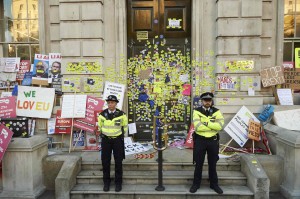A Brexit Deal Has Arrived. Now the Chaos Begins.
< < Go Back
The next few weeks will be an exercise in brinkmanship.
The selection of a new pope is traditionally announced by white smoke drifting from the Vatican chimney. The news of a draft agreement for Britain’s withdrawal from the European Union trickled out in a more modern manner: a volley of tweets.
A long waiting period is over. It is now almost 20 months since the British government notified the European Union that it wanted to leave the bloc. It is scheduled to do so on March 29.
The last year and a half has seen British politicians trying to figure out what, exactly, Brexit means. Finally, after months of negotiation, a draft deal has arrived. And now the real chaos can begin.
Prime Minister Theresa May has to accomplish a feat that almost everyone thinks is impossible: make her draft deal look like a success and find the votes to get it through the House of Commons. The trouble is that everybody hates Mrs. May’s version of Brexit. Remainers say that it will damage Britain’s economy compared with staying in the European Union. Brexiteers say it doesn’t fulfill their promise to “take back control” of immigration, regulation and trade.
It is, to be fair to her, perhaps the best deal that could have been achieved under the circumstances: There will be no border between Northern Ireland and the Republic of Ireland (achieved by keeping all of the United Kingdom in a customs arrangement with the European Union for the moment). European citizens living in Britain can continue to do so. Both sides agree in principle that the free movement of people from Europe will end.
The most contentious part of the agreement is the mechanism for ending it: A collapse in talks on the future relationship would trigger a “backstop” where Britain might have to accept European rules and regulations indefinitely. The mere thought of this is giving hard-line Brexiteers palpitations.
The Conservative Party is split over the wisdom of Brexit as a project, but it is united in disappointment over the form it has taken.
More From The New York Times:




